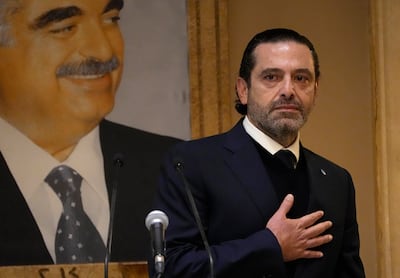Three-time prime minister Saad Hariri announced on Monday that he had suspended his participation in Lebanese politics and would not run in the coming elections, in a widely anticipated move that leaves the Sunni Muslim community with no clear leader as the country struggles with its worst economic crisis to date.
In an emotional address, Mr Hariri asked members of his political party, the Future Movement, to also withdraw from politics. Mr Hariri, 51, said the party would not present candidates in the elections in May.
“I announce my suspension from politics and I ask my family in the Future Movement to do the same,” he said. “I am not presenting myself as a candidate in the parliamentary elections and am not presenting any candidates from the Future Movement or in the name of the Future Movement.”
Speculation about Mr Hariri's intentions has been rife in Beirut since his return on Wednesday from a several-month stay in the UAE.
A veteran politician, Mr Hariri succeeded his late father and former prime minister Rafik Hariri when he was assassinated in 2005 as the leader of the Future Movement, which largely represents Lebanon's Sunni Muslim community.
'It wasn't written'
Visibly tearing up at the end of his speech, Mr Hariri recognised that he had failed to improve living conditions for the Lebanese population. The country's economic meltdown has pushed over three quarters of the population into poverty.
“The project of Rafik Hariri can be summarised in two ideas. First, stopping the civil war in Lebanon, and secondly, a better life for the Lebanese,” he said, referring to his father acceding the premiership in the aftermath of the country's 1975-1990 bloody civil war. “It wasn’t written for me that I would succeed in the second one.”
Mr Hariri blamed political compromise for his failures, including accepting the election of President Michel Aoun, who is allied with the Future Movement's political rival, Iran-backed Hezbollah.
These deals “may be the reason why I didn’t succeed in giving the Lebanese a get a better life. History will judge,” he said.

Mr Hariri recognised losses in his personal finances and “friendships abroad”, in a thinly-veiled allusion to Gulf states distancing themselves from him for cosying up to Hezbollah in the past years.
Mr Hariri's businesses, mostly inherited from his billionaire father, have faced difficulties, including the closure of the family's construction company in Saudi Arabia in 2017.
“I believe there is no positive opportunity for Lebanon due to Iranian influence, international floundering, national divisions, sectarian agitation and the state falling apart,” he said.
Mr Hariri's retreat from political life is widely viewed by Lebanese media as a new chapter in local politics. No other dominant Sunni leader has emerged but several politicians are vying for the position, including Mr Hariri's brother Bahaa.
Lebanon's government is designed to provide political representation of all Lebanese religious groups, with its three largest being Christian Maronites, Sunni Muslims, and Shiite Muslims.
The prime ministers are always Sunni Muslim, while the president is Christian and the parliament speaker is Shiite Muslim.
Local media reported at the weekend that Mr Hariri's supporters drove from all over the country to his house in Beirut, waving his party's blue flag and asking him to participate in the electoral process.
Mr Hariri responded by saying that his home would “remain open to all".
























